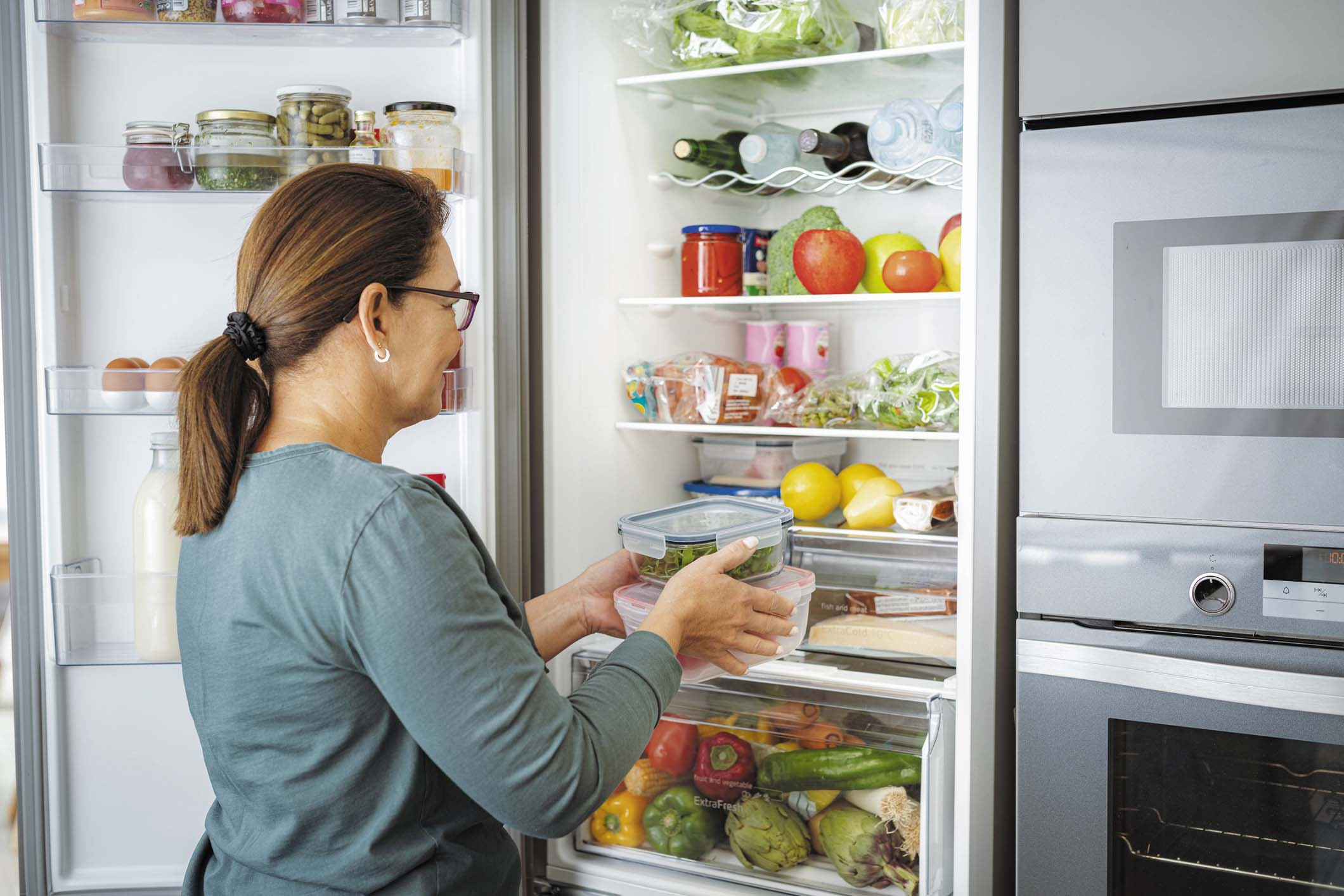Spring cleaning? Prioritize your fridge and pantry
Avoiding food poisoning starts in your own kitchen.
- Reviewed by Toni Golen, MD, Editor in Chief, Harvard Women's Health Watch; Editorial Advisory Board Member, Harvard Health Publishing; Contributor

With spring's arrival, maybe you're planning to attack those dusty baseboards, smeared windows, and cluttered closets. But if you've been neglecting your refrigerator and pantry, these hard-working storage areas should take priority — and they need far more than annual cleaning to help you avoid food-borne illnesses, Harvard experts say.
It's not a minor threat. Each year, an estimated one in six Americans — 48 million people — get sick from germs in food, according to the CDC. About 128,000 of them are hospitalized and 3,000 die as a result of food-borne illness.
Spring cleaning offers an opportunity not only to thoroughly scour your home, but also to give your fridge and pantry — which can harbor harmful bacteria — more than just a cursory swipe of a sponge. In the process, you can purge dated and possibly contaminated products from overlooked corners.
Think of it this way: these chambers don't just house your food; they also protect it—and you, by extension.
"It's tough to compare this to spring cleaning, because certainly I'd recommend cleaning out your refrigerator and pantry way more than once a year," says Cynthia Parenteau, associate director of public health in the Department of Environmental Health and Safety at Harvard University, who specializes in food safety. "Personally, I do it once a week. Every time new groceries go in, I make sure anything that's expired goes out, and I move older food to the front."
Dangerous complications
Food-borne illnesses result from microbes or toxins that contaminate foods or drinks. More than 30 pathogens (disease-causing agents), including Salmonella, norovirus, Listeria, Escherichia coli, and bacteria that cause botulism, are known to travel in food. Raw or undercooked poultry or meat, raw eggs, unpasteurized milk or dairy products, raw fruits and vegetables, and foods prepared in large batches kept at unsafe temperatures are vehicles for these pathogens.
Some lucky folks manage to skirt the consequences of eating germ-laden foods, while others develop food poisoning and suffer through symptoms such as nausea, vomiting, diarrhea, intense stomach cramps, and fever.
"The majority of us eventually get a food-borne illness," says Parenteau's colleague Marykate Franks, a senior environmental public health officer. "Most people associate it with the last thing they ate, though that may not be the case. If we're lucky, we feel crummy for a day or two, rebound, and write it off."
While food poisoning symptoms often resolve without problem, infections spread by food can have lasting, dangerous consequences. They sometimes lead to conditions such as arthritis, meningitis, kidney damage, or brain and nerve damage. (See "When should you see a doctor for food poisoning?") Parenteau notes that certain people — including pregnant women, older adults, and those with weakened immune systems — are susceptible to worse cases and more serious outcomes.
Cleaning strategies
How can you better protect yourself? Parenteau and Franks recommend these tips to tackle your refrigerator and pantry:
Take everything out. Approach your food clean-out with the same commitment as you would a closet purge. Completely emptying your fridge and pantry allows you to appraise each item for safety as well as inspect the inside of each space. "Even with something as simple as cleaning out your pantry, you'll find a wayward cheese puff at the back or a pile of cracker crumbs," Franks says. "You also have to be alert for mice or flour weevils that might be really intrigued by what you have in your cabinets."
Wash everything thoroughly. Pull out all shelving and clean every surface with food-safe sanitizer spray. (For a homemade version, Harvard experts suggest blending one tablespoon of unscented liquid chlorine bleach with a gallon of water.) Pay particular attention to any spills or dried, sticky areas. Make sure surfaces are dry before putting anything back.
Check expiration dates. Toss all expired food or drink items, as well as those whose containers are rusted or leaking. If you don't know the expiration date, a rule of thumb suggests keeping opened refrigerated items for seven days or less. "This is a good opportunity to go through your refrigerator and pull out all the Tupperware and leftover restaurant containers and make way for new stuff," Parenteau says.
Use your senses. Expiration dates differ from sell-by or best-used-by dates, which only suggest freshness. This is often applicable to items such as condiments and salad dressings. If those dates have only recently passed, check the product's appearance and smell for signs of decay. "If something doesn't quite smell right or the color of the food is off, trust your instincts," Franks says. "Better safe than sorry."
Pay attention to packaging. Generally, unopened or vacuum-packed foods will stay fresher longer. But once they're opened, the clock starts. "The date to use a product by becomes pretty confusing when you see a freshness date a month or two down the road but you've already opened it," Parenteau says. She advises using a marker to note on the package the date you unsealed it. Then keep it for only another seven days — especially packaged deli meats or hot dogs.
Avoid cross-contamination. Keep raw meat, seafood, and eggs separate from ready-made foods so germs don't spread. Store these items in sealed containers so juices don't leak onto other foods. And if your refrigerator features dedicated meat and produce drawers, use them only for those items. "You don't want juices that leak from chicken or beef packages getting on produce or food items that are not going to be cooked," Parenteau says.
When should you see a doctor for food poisoning?In most cases, food poisoning symptoms are mild enough to ride out without medical attention. But certain symptoms should prompt a doctor's evaluation, according to the CDC. These include
|
Don't forget your freezer. Since the whole purpose of freezing food is to keep it from spoiling, the freezer doesn't need as much attention as the refrigerator. But take a look at its contents every few weeks and weed items out. "Everyone is guilty of sticking something in the back of the freezer, saving it for a rainy day, and forgetting about it," Franks says. "It's good to pull that stuff out to check if it expired and assess if it's worth keeping."
Image: © fcafotodigital/Getty Images
About the Author

Maureen Salamon, Executive Editor, Harvard Women's Health Watch
About the Reviewer

Toni Golen, MD, Editor in Chief, Harvard Women's Health Watch; Editorial Advisory Board Member, Harvard Health Publishing; Contributor
Disclaimer:
As a service to our readers, Harvard Health Publishing provides access to our library of archived content. Please note the date of last review or update on all articles.
No content on this site, regardless of date, should ever be used as a substitute for direct medical advice from your doctor or other qualified clinician.
















